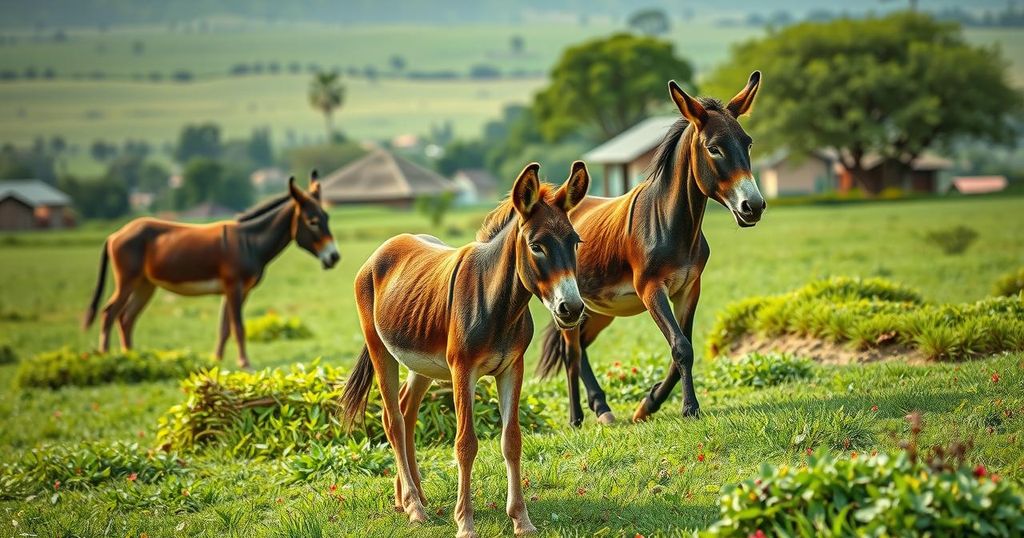- Twenty-nine students died in a stampede in the Central African Republic exam venue.
- The Kenyan government viewed recent protests as a coup attempt, with multiple casualties reported.
- UN officials warn of worsening humanitarian conditions in eastern DR Congo.
- Nigeria’s new tax laws intend to improve revenue collection and economic stability.
- The donkey skin trade is increasing poverty and theft across African communities.
Tragedy Strikes Students During Exam Time in Africa
On June 27, 2025, a tragic incident unfolded in the Central African Republic, where twenty-nine students lost their lives during a stampede at an exam venue in Bangui. The calamity was ignited by an explosion at an electricity transformer, sparking panic among nearly 6,000 students who were taking high-school finals. This explosion, which occurred just as the transformer had been repaired, sent hundreds scrambling for safety, resulting in numerous injuries as chaos ensued. Many students described the situation as terrifying, overcrowding in narrow exits as they sought to escape the mayhem. President Faustin-Archange Touadéra responded by declaring a national period of mourning and ensuring free medical care for the wounded.
Kenya’s Government Claims Protests Are Evidence of Coup Attempt
Meanwhile, in Kenya, a wave of protests swept through the country on June 25th, which has not gone unnoticed by the government. Interior Cabinet Secretary Kipchumba Murkomen labeled these demonstrations as an ‘attempted coup,’ suggesting the protests were a coordinated effort to undermine the current regime. Violence broke out during the unrest, leading to at least 16 deaths and over 400 injuries, including more than 300 police officers. Murkomen noted that some members of law enforcement sustained serious, life-altering injuries during these clashes. Attacks on properties affiliated with government officials also contributed to the turmoil. Murkomen commended law enforcement for maintaining order and preventing assaults on key government buildings, while he pledged investigations into the violence and the casualty figures.
UN Calls for International Support Amid Congolese Crisis
A separate issue of immense importance is unfolding in the Democratic Republic of the Congo, where the UN’s urgent plea for international assistance has grown louder. UN Emergency Relief Coordinator Tom Fletcher highlighted the dire conditions faced by conflict-affected individuals in eastern DRC. This region’s hardship is exacerbated by ongoing violence from the Rwanda-backed M23 rebels against the DRC army, which has triggered severe human rights violations and exacerbated an already precarious humanitarian crisis. More than 20 million people in DRC currently need aid, but increasingly strained funding has compromised the ability of aid workers to assist. Despite the setbacks, UN teams persist in their mission to access communities in desperate need, urging the global community to show renewed solidarity and support, as lives hang in the balance.
Nigeria’s Tax Reform Aims to Boost Economic Stability
In Nigeria, President Bola Tinubu has taken significant steps to reform the country’s tax system by signing four crucial bills into law. This overhaul aims to simplify the revenue collection process while reducing the tax burden for individuals and businesses alike. The newly enacted laws, including the Nigeria Tax Bill and the Nigerian Tax Administration Bill, focus on enhancing efficiency in tax collection to generate much-needed government revenue. Analysts suggest that these reforms, which will be implemented starting January 1, 2026, might bolster the economy by streamlining how taxes are collected and utilized.
Donkey Skin Trade’s Alarming Impact on African Communities
In a dire report released by The Donkey Sanctuary, the dangerous impact of the global donkey skin trade has come to light, revealing a disturbing trend across Africa. The study ‘Stolen Donkeys, Stolen Futures’ sheds light on how high demand for donkey skins, particularly for use in traditional Chinese medicine, has led to extensive donkey theft. It’s a situation that significantly hurts rural communities, primarily affecting women and children who rely on these animals for their livelihoods. Loss of a single donkey can lead to a staggering income drop of up to 73% for families, which exacerbates poverty and social instability. The African Union has taken a stand by agreeing to halt the slaughter of donkeys for their skins and committing to protect both these animals and the communities that depend on them.
The past weeks have seen significant tragedies and developments across Africa, from the heartbreaking stampede in the Central African Republic to the contentious protests in Kenya. Meanwhile, ongoing struggles in the DRC call for increased humanitarian aid, while Nigeria seeks to shake up its tax system for better resource management. The troubling results of the donkey skin trade reveal how one sector can drastically affect vulnerable populations. These events emphasize the need for immediate action and systemic changes across the continent to address these pressing issues effectively.






